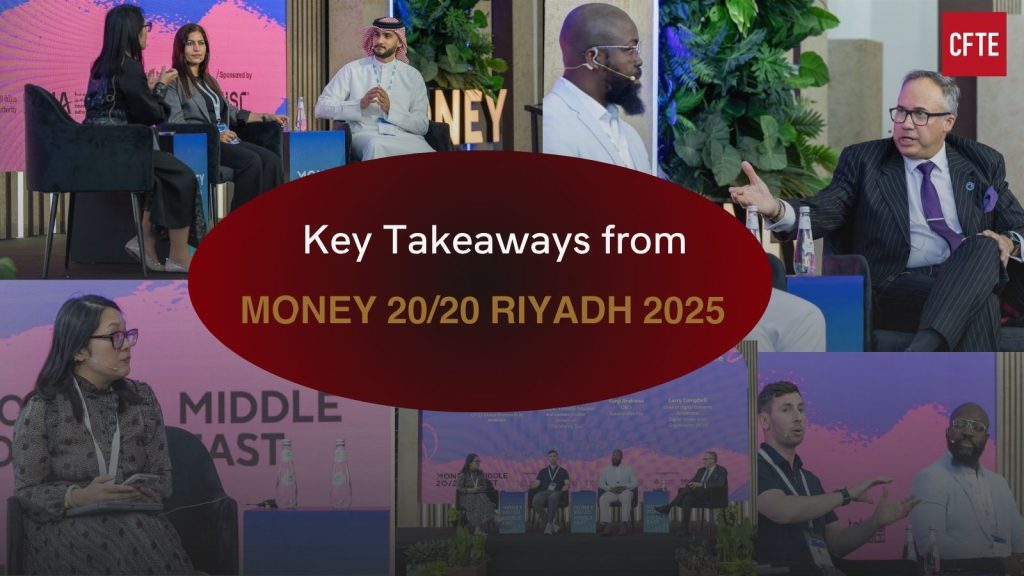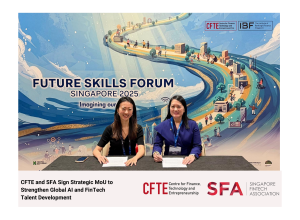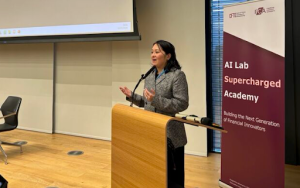
This year’s Money20/20 Middle East was not just another fintech conference. It was a reflection of how finance, technology, and inclusion are being redefined — and how the Kingdom of Saudi Arabia has emerged as one of the world’s most dynamic hubs for digital transformation.
Across three powerful days, conversations in Riyadh revolved around one central question:
What does readiness look like in the age of AI-driven finance?
For CFTE and Global Women in AI (GWAI), the event represented both a platform and a turning point. As digital ecosystems expand and new technologies reshape economies, it’s becoming clear that skills, inclusion, and leadership are now the most important currencies of all.
1. From Oil to Ownership: Financial Literacy as the Infrastructure of the Future
In a nation historically built on oil, a new kind of wealth is emerging — financial capability.
At the session “From Oil to Ownership”, Tram Anh Nguyen, Co-founder of CFTE and Chairwoman of Global Women in AI, led a conversation with Naif AbuSaida (Hakbah), Abdullah Alandas (Wadaie), and Turky Kabarah (Saudi Central Bank) on how financial literacy is transforming from a side initiative into national infrastructure.
With over 70% of Saudis under 35, financial literacy is becoming the cornerstone of sustainable growth and social mobility. From gamified savings apps to Sharia-compliant digital tools, the Kingdom is embedding education directly into the fintech experience.
“Financial literacy is not optional — it’s the foundation of innovation, inclusion, and resilience.”
The session revealed a crucial truth: without education, innovation risks exclusion.
Saudi Arabia’s model — combining regulation, entrepreneurship, and purpose — is fast becoming a blueprint for inclusive digital finance across emerging markets.
2. Code, Capital, and Confidence: Women Redefining FinTech and AI Leadership
The next frontier of inclusion lies at the intersection of code, capital, and confidence.
In this standout discussion, Tram Anh Nguyen, alongside Amira Abdelaziz (Central Bank of Egypt, Executive Committee Member at GWAI) and Saud Swar (Senior Vice President, Mastercard), unpacked how women are reshaping the governance, investment, and ethics of financial technology.
It was not a conversation about representation — it was about redesigning leadership.
Women are leading the development of responsible AI frameworks, driving inclusive product design, and influencing capital allocation strategies that prioritise impact alongside innovation.
“Inclusion is not just a value — it’s a strategy. Confidence, collaboration, and diversity are now essential for scaling trust in finance.”
From boardrooms to regulators’ offices, this is the new architecture of leadership: one that reflects the societies technology is meant to serve.
3. From Awareness to Access: Building the Infrastructure for Financial Inclusion
Inclusion cannot stop at awareness — it must translate into access.
In the panel “From Awareness to Access: Building Financial Literacy as Core Infrastructure for Emerging Economies”, Tram Anh Nguyen exchanged with Gabriel Nussbaum (The Money Guy), Tunji Andrews (CEO, Awabah / PenPay), and Larry Campbell (Digital Cooperation Organization).
Together, they explored how financial literacy, regulation, and innovation must work hand in hand to bridge the gap between knowledge and action.
“Without financial literacy, even the most advanced innovations risk being underutilised.”
The discussion highlighted that financial inclusion isn’t a byproduct of growth — it drives growth. It’s about designing ecosystems where education, access, and trust evolve together, creating opportunities for millions to participate confidently in the global economy.
4. A Defining Moment: The Launch of Global Women in AI (GWAI) in Riyadh
Money20/20 Middle East was also the stage for a historic moment: the Saudi Opening Celebration of Global Women in AI (GWAI).
Led by Tram Anh Nguyen, GWAI launched as a global movement to ensure women are not just participants in the AI revolution, but architects of it.
The launch gathered policymakers, regulators, and innovators including Reem Aljasser (Saudi Central Bank) and Amira Abdelaziz (Central Bank of Egypt) — marking Riyadh as a symbol of leadership, progress, and inclusion.
“This is not just the beginning of an initiative, but a movement — to ensure women are central to shaping the future of artificial intelligence.”
GWAI’s mission is clear:
💜 To provide access to education and structured learning in AI
💜 To connect women across borders into a global community of leadership
💜 To create pathways for mentorship, visibility, and real-world impact
As Saudi Arabia cements its global role in digital transformation, GWAI’s launch in Riyadh is more than symbolic — it’s strategic. It marks the region’s commitment to inclusion as a driver of innovation and competitiveness.
5. From Riyadh to the World: What This Means for the Future
Money20/20 Middle East underscored one defining truth: the future of finance will be built not only on technology, but on trust, talent, and readiness.
Saudi Arabia’s transformation under Vision 2030 demonstrates what’s possible when ambition meets capability — when policy, innovation, and education align.
For CFTE, these conversations go far beyond the event. They are part of a broader mission:
To build a world where professionals, policymakers, and institutions are AI-ready, financially literate, and globally connected.
Because the real revolution in finance isn’t digital — it’s human.
In Summary
Money20/20 Middle East wasn’t just about what’s next in fintech — it was about who will lead it.
From oil to ownership, from code to confidence, and from awareness to access, Riyadh showed that the future of finance is being built by those who understand that inclusion is the ultimate innovation.



